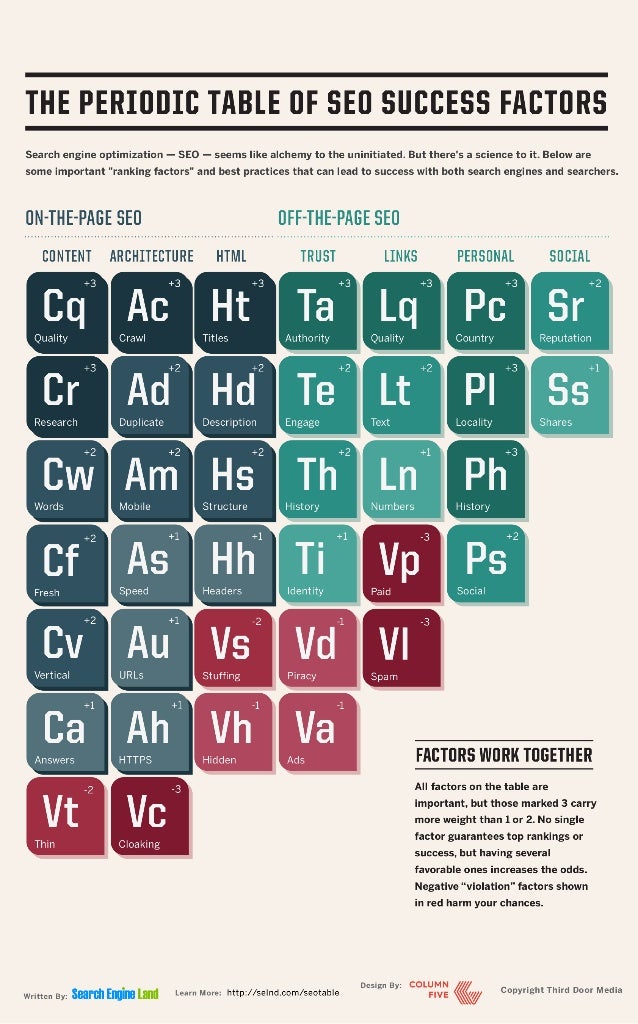What Is SEO / Search Engine Optimization?
What is SEO?
SEO stands for Search Engine Optimization, which is the practice of increasing the quantity and quality of traffic to your website through organic search engine results.
What goes into SEO?
To understand what SEO really means, let's break that sentence down and look at the parts:
- Quality of traffic. You can attract all the visitors in the world, but if they're coming to your site because Google tells them you're a resource for Apple computers when really you're a farmer selling apples, that is not quality traffic. Instead you want to attract visitors who are genuinely interested in the products that you offer.
- Quantity of traffic. Once you have the right people clicking through from those search engine results pages (SERPs), more traffic is better.
- Organic results. Ads make up a significant portion of many SERPs. Organic traffic is any traffic that you don't have to pay for.
Search Engine Land’s SEO Library
The SEO Library is an area within Search Engine Land that provides a collection of all stories we’ve written on the topic of SEO. We also have sub-categories, including:
- SEO: Blogs & Feeds
- SEO: Cloaking & Doorway Pages
- SEO: Content and Writing
- SEO: Crawling and Robots
- SEO: Domains & URLs
- SEO: Duplicate Content
- SEO: Flash
- SEO: General
- SEO: Image Search
- SEO: Local
- SEO: Mobile Search
- SEO: Redirects & Moving Sites
- SEO: Spamming
- SEO: Submitting & Sitemaps
- SEO: Tagging
- SEO: Titles & Descriptions
- SEO: Video Search
How SEO works
You might think of a search engine as a website you visit to type (or speak) a question into a box and Google, Yahoo!, Bing, or whatever search engine you're using magically replies with a long list of links to webpages that could potentially answer your question.
That's true. But have you ever stopped to consider what's behind those magical lists of links?
Here's how it works: Google (or any search engine you're using) has a crawler that goes out and gathers information about all the content they can find on the Internet. The crawlers bring all those 1s and 0s back to the search engine to build an index. That index is then fed through an algorithm that tries to match all that data with your query.
SEO For Beginners: 3 Powerful SEO Tips to Rank
SEO For Beginners: 3 Powerful SEO Tips to Rank #1 on Google in 2019
Are you new to SEO and want to rank #1 on google this upcoming year? Here are 3 SEO strategies that will boost your rankings!
#1: Focus on content
Google has this update called Hummingbird, and with Hummingbird, websites who just have content on everything won't do as well as sites which focus on one single niche and are super thorough.
You want to be VERY thorough with your SEO content. Poke holes in your content and fill them all up, so then that way people are like, "This is the end all site "that you should end up reading "if you're interested in dating online."
#2: Optimize your title tag and your meta description
Have you ever done a Google search, and noticed that every time you do it, there is this link at the top, and then there's this one sentence with a link at the top is called the title tag.
And the description below is called the meta description.
Now think of it this way, if you search for the phrase online dating, and you don't see the word online dating in neither the title or the description, are you going to click on the result?
Well if you are, there's something wrong, because why would you click on a result that isn't related to what you're looking for?
In addition to that, have you ever searched for a term like online dating? And have you ever noticed that the word isn't in the title or description?
That's because Google tracks who's clicking on what listing, and they've learned that when a keyword is in the listing, that same keyword that you're searching for, they know you're way more likely to click through.
So in your title tag and your meta description, make sure you include the keyword. But you can't just add the keyword, "online dating," right?
The easiest way and what I would do and I wish it was this simple; I will just put "online dating, online dating, online dating, online dating."
If I could put it 20 times so people would know that the article is on online dating, I wish I would get more clicks.
But it's not that simple.
Yes you have to include the keyword in your title and your description, but it has to be appealing. If it doesn't flow in a sentence, it's not easy to read, and it's not appealing or evoking curiosity, no one is gonna click through.
#3: Use Google Search Console
Did you know that Google gives you a tool that teaches you how to rank number one on Google?
Yes I know that sounds ridiculous but it is true, and it's called Google Search Console.
If you're not already a user of it, sign up.
It doesn't cost a dollar. You're missing out if you're not using it.
I can't emphasize that enough. So now that you're using Google Search Console...give it a few days because it takes some time to populate data. You'll see a screen that shows Search Analytics and this shows you all the pages on your website that are getting you traffic. But the cool thing about Google Search Console is they also show you which articles are getting impressions.
Take all the keywords you're getting impressions for and start adding them to your copy.
Now we have an article on Instagram, and it teaches you how to get over 300 targeted Instagram followers per day.
The article is around 10,000 words. When I first wrote that article, it wasn't 10,000 words, it was roughly 2,500.
I went to Google Search Console, I saw all the people that are searching for terms related to the article, I added them within that article. I made it more thorough and you know what?
My SEO traffic more than tripled to that article. Yes it is that simple. And when I made that change, it didn't happen right away, but I noticed the results within 50 days. That's not a long time.
Are you new to SEO and want to rank #1 on google this upcoming year? Here are 3 SEO strategies that will boost your rankings!
#1: Focus on content
Google has this update called Hummingbird, and with Hummingbird, websites who just have content on everything won't do as well as sites which focus on one single niche and are super thorough.
You want to be VERY thorough with your SEO content. Poke holes in your content and fill them all up, so then that way people are like, "This is the end all site "that you should end up reading "if you're interested in dating online."
#2: Optimize your title tag and your meta description
Have you ever done a Google search, and noticed that every time you do it, there is this link at the top, and then there's this one sentence with a link at the top is called the title tag.
And the description below is called the meta description.
Now think of it this way, if you search for the phrase online dating, and you don't see the word online dating in neither the title or the description, are you going to click on the result?
Well if you are, there's something wrong, because why would you click on a result that isn't related to what you're looking for?
In addition to that, have you ever searched for a term like online dating? And have you ever noticed that the word isn't in the title or description?
That's because Google tracks who's clicking on what listing, and they've learned that when a keyword is in the listing, that same keyword that you're searching for, they know you're way more likely to click through.
So in your title tag and your meta description, make sure you include the keyword. But you can't just add the keyword, "online dating," right?
The easiest way and what I would do and I wish it was this simple; I will just put "online dating, online dating, online dating, online dating."
If I could put it 20 times so people would know that the article is on online dating, I wish I would get more clicks.
But it's not that simple.
Yes you have to include the keyword in your title and your description, but it has to be appealing. If it doesn't flow in a sentence, it's not easy to read, and it's not appealing or evoking curiosity, no one is gonna click through.
#3: Use Google Search Console
Did you know that Google gives you a tool that teaches you how to rank number one on Google?
Yes I know that sounds ridiculous but it is true, and it's called Google Search Console.
If you're not already a user of it, sign up.
It doesn't cost a dollar. You're missing out if you're not using it.
I can't emphasize that enough. So now that you're using Google Search Console...give it a few days because it takes some time to populate data. You'll see a screen that shows Search Analytics and this shows you all the pages on your website that are getting you traffic. But the cool thing about Google Search Console is they also show you which articles are getting impressions.
Take all the keywords you're getting impressions for and start adding them to your copy.
Now we have an article on Instagram, and it teaches you how to get over 300 targeted Instagram followers per day.
The article is around 10,000 words. When I first wrote that article, it wasn't 10,000 words, it was roughly 2,500.
I went to Google Search Console, I saw all the people that are searching for terms related to the article, I added them within that article. I made it more thorough and you know what?
My SEO traffic more than tripled to that article. Yes it is that simple. And when I made that change, it didn't happen right away, but I noticed the results within 50 days. That's not a long time.











